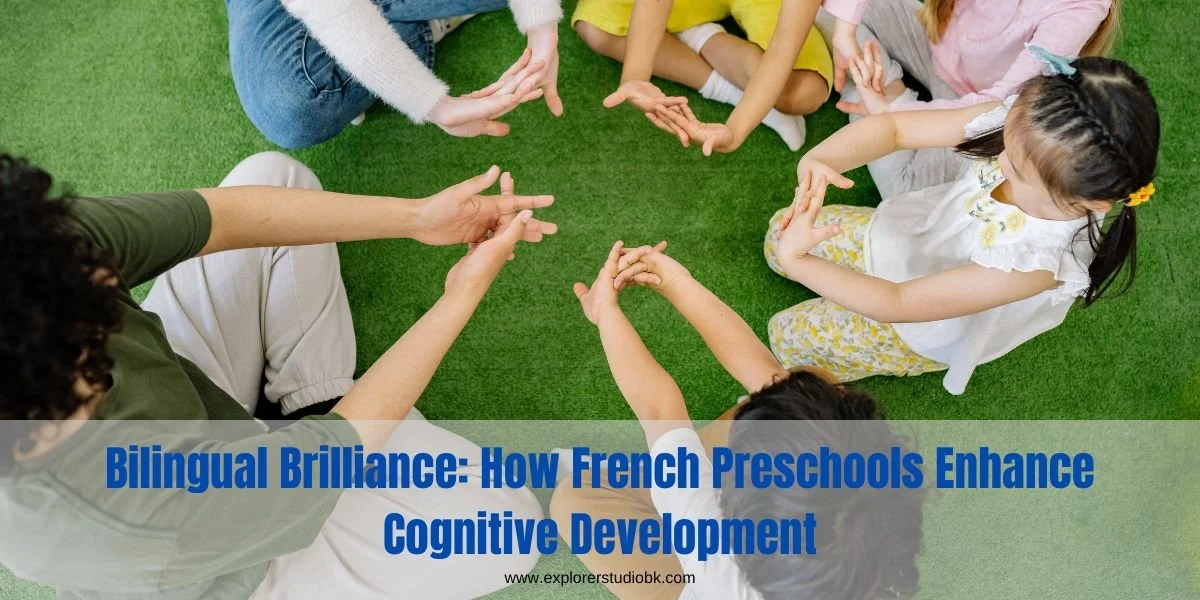Bilingual Brilliance: How French Preschools Enhance Cognitive Development
Cognitive development plays a critical role in shaping a child's overall growth and future success. In recent years, the benefits of bilingualism in cognitive development have gained widespread recognition. French preschools, with their focus on bilingual education, have emerged as leaders in fostering cognitive skills in young learners. In this blog post, we will explore how French preschools enhance cognitive development and the specific advantages they offer. From improved problem-solving abilities and enhanced creativity to heightened executive functioning skills, French preschools provide a unique environment that stimulates cognitive growth. By understanding the impact of bilingual education on cognitive development, parents can make informed decisions about the best educational path for their children.
The Cognitive Benefits of Bilingualism
Bilingualism, the ability to speak and understand two languages, has been linked to numerous cognitive advantages. Research has shown that bilingual children often outperform their monolingual peers in various cognitive tasks. Learning two languages provides constant mental stimulation, which leads to cognitive flexibility, improved attention control, and enhanced problem-solving abilities.
In the context of French preschools, children are exposed to both French and their native language. This bilingual environment offers unique cognitive benefits. By engaging in language switching, bilingual children learn to control their attention, inhibit irrelevant information, and focus on relevant details. This cognitive flexibility strengthens their executive functioning skills, allowing them to adapt and succeed in different cognitive tasks.
Moreover, bilingualism has been associated with enhanced creativity. When children learn to express themselves in two languages, they develop a broader range of linguistic and cognitive resources. This linguistic flexibility fosters creativity and allows children to think outside the box, find alternative solutions, and approach problems from different perspectives.
Enhanced Problem-Solving and Critical Thinking Skills
French preschools, with their emphasis on bilingual education, provide an ideal setting for the development of problem-solving and critical thinking skills. When children learn two languages, they develop a metalinguistic awareness, the ability to think about language and analyze its structure. This metalinguistic awareness transfers to other domains, enabling children to analyze and solve problems more effectively.
Bilingual children often exhibit greater flexibility in their thinking. They are more adept at shifting between different strategies and considering multiple perspectives, which are crucial skills for problem-solving. This cognitive flexibility allows them to approach challenges from various angles and find innovative solutions.
French preschools encourage critical thinking through interactive and inquiry-based learning. Children are encouraged to ask questions, think critically, and explore different possibilities. By engaging in activities that promote independent thinking, French preschools nurture children's analytical reasoning skills and foster a problem-solving mindset.
Improved Executive Functioning Skills
Executive functioning refers to a set of cognitive processes that allow individuals to plan, organize, and regulate their behavior. Bilingualism, as experienced in French preschools, has been shown to enhance executive functioning skills in young learners.
Language switching, a common practice in bilingual environments, requires constant monitoring and control of attention. Bilingual children develop stronger inhibitory control, allowing them to filter out irrelevant information and focus on the task at hand. This enhanced inhibitory control translates into better self-regulation and impulse control, essential skills for academic success and social-emotional development.
Furthermore, bilingualism strengthens working memory, the ability to hold and manipulate information in mind. When bilingual children switch between languages, they exercise their working memory, leading to improved memory retention and information processing skills. This cognitive advantage supports academic performance and helps children manage complex tasks effectively.
Bilingualism also enhances cognitive flexibility, the ability to adapt to new situations and think flexibly. The constant exposure to two languages in a French preschool environment challenges children to switch between different linguistic systems and adapt their communication accordingly. This cognitive flexibility allows children to approach learning with an open mind, embrace new challenges, and adapt to changing circumstances.
Conclusion
French preschools, with their focus on bilingual education, offer a unique opportunity for cognitive development in young learners. The cognitive benefits of bilingualism, such as improved problem-solving abilities, enhanced critical thinking skills, and strengthened executive functioning, make French preschools an excellent choice for parents seeking to provide their children with a cognitive advantage. By embracing bilingual brilliance in French preschools, parents can nurture their child's cognitive growth and set them on a path to success in both academic and personal endeavors.


